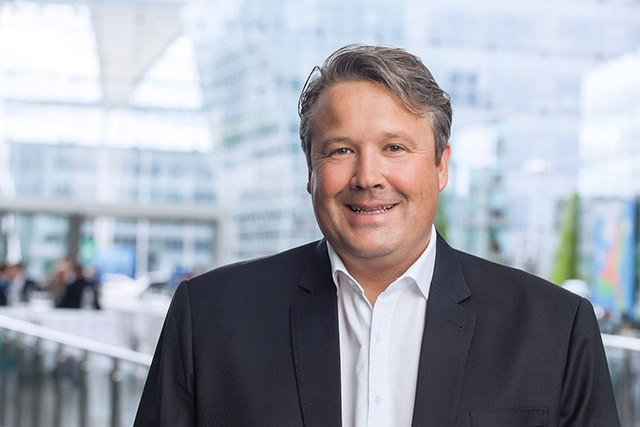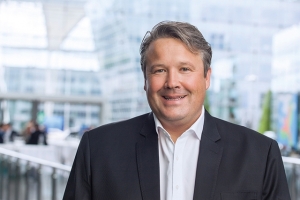Hilton Batumi GM: We Need to Have a Better Understanding of the Govt’s Plans for Tourism
Exclusive Interview
As part of the series of GT Live Interviews, Katie Ruth Davies, GEORGIA TODAY Editor-in-Chief, met Torsten Weller, the General Manager of Hilton Batumi, to talk about their handling of the COVID-19 pandemic, what they have done to support staff and their community, and his outlook for the future. Mr Weller has been in Georgia since January 2017 and has also held positions in Austria, Germany and the United States.
How did you cope throughout the pandemic? Did you keep your staff on board?
It was quite an adventure! It was a very uncertain time, things were changing almost by the hour. Guest numbers were decreasing and suddenly the pandemic became very real, and business got down to the point where we had to make the decision to temporarily suspend our operations. We shut down in a very structured way, keeping safety in mind.
We tried to deal with staff by offering a 50% vacation and paid very well until the state of emergency came. Then, unfortunately, other than the team members needed to maintain the building and deal with phone calls and such, others had to be sent on furlough. This was obviously a very tough decision to make. However, we kept in touch with them: the team is one of the most important parts of our industry, because we are an industry of people serving people. We set up a team WhatsApp group and had Zoom calls with the leadership to keep them updated about the situation, and to check how everyone was doing; offering support, both moral and financial. It felt very good to stay in touch with our team.
What support did Hilton Batumi give to the local community?
We worked with the Red Cross here in Adjara, helping collect and deliver some 4000 kilograms of food to families. Some of our team volunteered for the Red Cross in the supermarkets, helping to get the food packed. This was the biggest contribution we could make at that point. The day you start sharing is the day you start caring.
Can you compare business lost this year to what you were expecting based on last year?
I don’t have the numbers yet, but it's naturally going to be massively less- we’ve seen a huge decrease in guests and room bookings. The supply is way bigger than the demand. The entire business world is upside down, and that means we have a “new normal” and need to change management and the way we do things.
What measures have you taken to protect future guests? And how long do you think these measures will need to remain in force?
Hilton implemented a program called Clean Stay. As soon as the guest enters the hotel, they can see our aim to deliver top class standards on disinfection, social distancing, and cleanliness. Guests can trust that as they walk around the hotel, they don’t need to be worrying about the virus all the time. Part of Clean Stay is the eighteen touch points in guest rooms which are most frequently use, and these get disinfected with a special detergent. The safety and security of our guests comes first.
We have stickers on the floor for social distancing, and we give all our team members personal protective equipment (PPE). Also, they have a little bottle of disinfectant in their pocket they can use, and that gives them that security and confidence to be who they are. This is the most important element. You don't need to be scared. You shouldn't be stressed. You should be in an environment where you can be who you are. Because that's our strength. And our Clean Stay program is fantastic for both the safety of guests and the safety of team members.
As for how long this “new normal” will exist, I’d say it will remain, perhaps with a few adaptations, but it sets new standards in the entire process. Even when the pandemic is gone, I'm sure the program will still be there, seeing even higher standards than we had before.
How will the loss of flights (WizzAir cancelled 19 Kutaisi routes, for example) affect Hilton Batumi, and how will you adapt to the changing demands?
It will have a huge impact on us, and every one of our competitors. We're all sitting in the same boat and so is the entire tourism industry.
I have to say a big thank you to the Georgian government. I think from day one, they realized the complexity of the crisis and took the right measures, that's why we are where we are now, with almost no cases in Adjara and very low numbers of infection in the country. And we went through some very challenging times. We managed to get out of this together and then we came up with ways to reopen our hotels.
There do remain a lot of questions, though. What are the bilateral conversations between countries, between Georgia and Israel, for example? When will international travel be allowed? We need to see momentum from the government towards the next steps, and we need a little bit more information so we can see the picture ourselves and move forward more clearly.
That said, I'm surprised how many travelers we already have in June, now that we can sell rooms. It's amazing, and I can see this positive trend could continue. But before we enter the less active tourist season, we need to have a plan for international travelers coming back. Otherwise, it's going to be very challenging. In Georgia, November, December, January, February is the low period and we need to continue the good relationship and the good work we started through associations with the government to look a little bit further ahead together and talk about how to tackle the challenges.
Tell us more about your collaboration with the government.
We were actively involved in setting up guidelines with the Georgian National Tourism Administration, which worked very fast to get them implemented. I'm also a board member of the European Business Association, so we were able to lobby to the government about what needed to be done for people who have been on furlough from the beginning of the crisis, which undoubtedly contributed to their getting 200 GEL support per month from the State. Only communication, working together, cooperation and talking about things will move us forward. And that is the way we need now to continue under these new circumstances.
Tell us about your Youth Career Support program.
I’ll tell you about Hilton’s CSR program, called ‘Travel with Purpose,’ where we have three pillars. The first is about the environment: we want to reduce our CO2 emissions by 50% to 30%. Another is humility. We need to be who we are, to be friendly with each other, to help each other while being cautious, and to follow the guidelines set out by the government.
Another pillar aims to bring 1 million young people into jobs by offering youth opportunities, within which we follow the concept of inclusion and diversity. In Georgia, we found vocational schools able to do the theoretical training for front office, kitchen, restaurant, etc, and got involved from the very start. At the beginning of 2018, we had 15 young people, 16-17 year-olds, some older, who we were training on the job. At the end of last year, we had the first graduation ceremony for the first four students in the program. The Deputy Ministry of Education was there, and they all got a certificate. Today, Hilton Batumi has 10 trainees who will be back to work on July 1st.
Aside from the hospitality sector, youth in Georgia can get a dual education in agriculture and winemaking, too, meaning they end up with a certificate and a skill-set from practical experience. Georgia needs such skilled people with its growing tourism market; it needs to up the service quality through education. This is something the European Business Association advocates for as well, in cooperation with the government: for other companies to let young people in, to not be afraid to train them. There are huge advantages to developing a young person in your company.
Last year, it was Hilton’s 100th birthday. And to celebrate, we set up a training room in the vocational training college ‘Black Sea College,’ building in a reception, a bedroom and a mini bar, so that the students not only get the theoretical training in school, but also get to experience the practical side of hospitality there. Hilton’s own people are going to the college and running training sessions, helping students to move forward. Even during the lock-down, four team members did trainings online with our partner schools, keeping up our community work.
Tell us more about the special packages you have for domestic tourists.
We have a very special package you can book on our website, called ‘Dream Away,’ which offers a 20% discount on the published rates. It's flexible, meaning until August 30, you can cancel your room free of charge 24 hours prior to arrival. We included parking, and a choice of rooms. And we also reached out to travel agents with very good offers to sell. With ‘Dream Away,’ you get to experience the Clean Stay program and the quality expected of Hilton. It's more important than ever to deliver quality at this time: you need to deliver quality to build customer trust.











